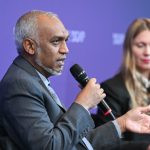
The end of the year is most often a time for us to reflect, and a time to plan for the coming year. Most of our new year’s resolution involves changing of minor habits. For example, to eat more healthy, to hit the gym or to quit smoking. For us Maldivians, a new year’s resolution could be to increase time spent with nature, to go on frequent island getaways, or to start playing a sport. But most of the time, these particular changes in lifestyle are unlikely to be effective in the long run.
In setting our resolution, we must be willing to step back and take stock of the things that really matter in our life, and what we consider a good life to be. The resolutions must align with what we value, and new habits must go beyond our self-interest and to a larger purpose. For achieving healthy well-being, we need a balance in everything, from our diet to our working lives.
Our income is important, but so is our health, security and good relationships.
In fact, sometimes being less productive economically can make us better off in terms of well-being. One study found that in Muslim countries, like the Maldives, even though fasting and observances during the month of Ramadan had a negative impact on GDP growth, individuals reported being happier and more satisfied with their lives. This is proof that giving something up for a greater good can be deeply rewarding.
Several other studies had shown that people with strong social relationships, or who report being closer to their family and friends, tend to be more satisfied with their lives.Therefore our new year’s ideal resolutions could best be aligned with the interpersonal aspect of our lives.
After all, even if our work does play a huge role in our lives, we must take time to step back from our busy lives and take time to express gratitude to family, friends and our creator. It may be human nature to always want more, but a good life also rests on gratitude.












